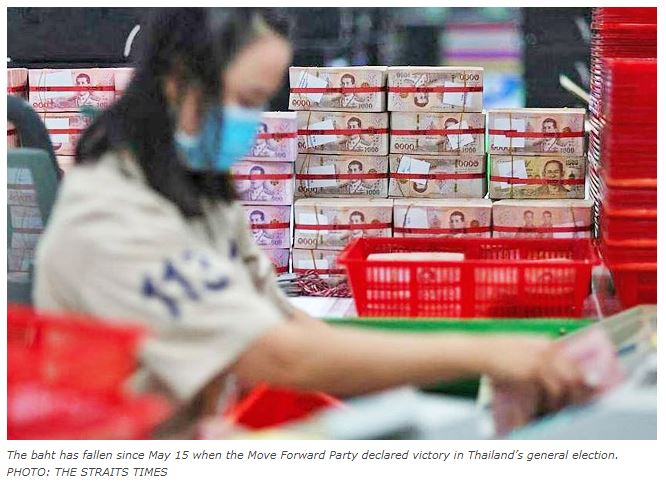Thai baht under more pressure as political uncertainty persists
ANN/THE STRAITS TIMES – A new low for the Thai baht looms and not even a rate hike by the central bank is likely to halt its slide.
The Asian currency weakened for its third straight week against the United States (US) dollar, closing at 34.77 on Friday and heading towards February’s year-to-date low of 35.39.
Against the Singapore dollar, the baht fell to 25.7037 on Friday, down 1.7 per cent since May 15 when the opposition Move Forward Party declared victory in Thailand’s general election.
The baht was 25.6698 to the Singdollar as at 4.40pm yesterday.
Hurdles to the Move Forward coalition are growing, increasing political uncertainty over who will form the next government in a development weighing on the baht as it spurs foreign funds to sell both the nation’s equities and bonds.
“The biggest concern for the market right now is still whether the opposition-led coalition will get enough support from the Senate, which has the power to select the prime minister,” said emerging markets strategist at Credit Agricole CIB’s Hong Kong branch Jeffrey Zhang.
Against this backdrop, the Bank of Thailand is scheduled to release its interest rate decision tomorrow. The central bank is forecast to raise rates by 25 basis points to two per cent after governor Sethaput Suthiwartnarueput said earlier in May that it will stick to its gradual and measured monetary tightening to curb inflation.
Emerging markets foreign exchange strategist at Natwest Markets in Singapore Galvin Chia said: “I don’t think the Bank of Thailand’s decision will have much bearing on the baht, given that low policy rates relative to regional peers mean that the carry consideration is negligible.”
Further risks lie to the north in China, with some analysts, such as those at Goldman Sachs Group, forecasting more gloom for the renminbi. Investors will be monitoring China’s purchasing managers’ index data, due the same day as the Bank of Thailand’s rate decision, to see if the nation’s economic rebound this year remains underwhelming.
“China is Thailand’s largest trading partner and was its largest source of inbound tourists,” said Chia. “As a result, the baht has tended to be quite sensitive to large moves in the renminbi.”
In the US, traders are raising their expectations on the Federal Reserve’s terminal rate, pushing up the greenback. Chia sees the dollar-baht testing its year-to-date highs in the coming weeks if recent dollar strength continues or the renminbi extends its slide lower.
Source: https://borneobulletin.com.bn/thai-baht-under-more-pressure-as-political-uncertainty-persists/


 Thailand
Thailand




